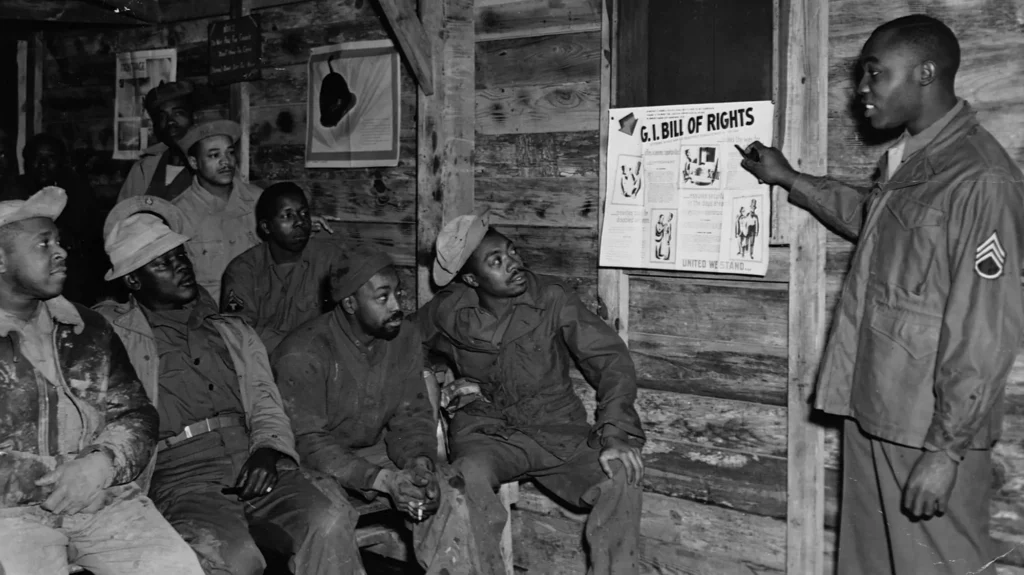In this segment, we hear from RepGen’s own David Mayer and Robin Mills on how racial discrimination in the GI Bill shaped the destiny of two families.

Staff Sergeant Herbert Ellison explaining the G.I. Bill to fellow Black soldiers Source: Library of Congress
Robin Mills
Born in 1979, a proud Black woman, I am the descendant of Annie Bradley, my great-great-great grandmother who was born into slavery in the 1830s. I was raised to believe that if I did well in school and went to college, I could get a good job and achieve the American dream of owning a home and 2.5 children. I did great in school: skipped the 7th grade, graduated from high school early and with honors. My mother was the first in our family to earn a BA (she was class of ’99; I was class of ’01); I was the first to obtain a Master of Arts. I have been working full-time at UC Berkeley as a Health Educator and part-time lecturer since 2008, I have two beautiful daughters and a sweet Boston terrier. I did everything I was told to do yet the dream of home ownership continues to prove unattainable. My maternal grandfather, Johnnie was a WWII vet. For many WWII vets their service to the country elevated them to middle-class status through the GI Bill which paid for college and VA home loans made home ownership a reality. Unfortunately, due to segregation, Black people, like my grandfather, were excluded from GI Bill and VA home loan benefits. As such, there was no generational wealth to be passed down to me. took out additional student loans to pay for housing and tuition during my MA. I have been repaying my student loans since graduating in 2006. Having to repay student loans has proven to be quite the hurdle in my quest for home ownership for many reasons.
David Mayer
I grew up in the 1960s and ’70s in San Rafael, California. And for much of my life I felt my story and that of my family’s embodied the Horatio Alger myth that anyone through hard work intelligence and a virtuous life can achieve the American dream. You see my father was born extremely poor in an orphanage. What changed his life was his education, and his ability to join the military. My father went to UC Berkeley, with school being paid due to his being in the ROTC program. After college, he served as an officer in the US Army. After serving our country, he was able to take advantage of the GI bill. This allowed him to go to graduate and post graduate school without debt. Even more impactful, was his ability to take advantage of the VA home loan program. In 1959, he was able to buy a home in San Rafael that was planned by the developer for Veterans to take advantage of the VA loan program. This planned community did not include Black veterans. This home appreciated, allowed him to buy other property, buy his drugstore in Sausalito and provide wealth and position in our community. For me, this home allowed me to go to resourced public schools, obtain an excellent education from a prestigious university without much debt. Additionally, the wealth from my parents assisted me with buying my first house at the age of 19. The wealth I accumulated in that house, in which I still live, allowed me to start my own business. The wealth from my home and business allowed me to send my children to good schools and universities where they finished with little to no student debt. It is in this way that I can see a straight line from the military benefits that my father received to the wealth that he accumulated to the advantage and privilege that I’ve enjoyed.
